Ford Transit Bus VS Nissan Qashqai – Specs, Efficiency & Price Comparison
Which model is the better choice – the Ford Transit Bus or the Nissan Qashqai? We compare performance (150 HP vs 190 HP), boot capacity (0 L vs 504 L), efficiency (9.40 L vs 5.10 L), and of course, the price (50500 £ vs 29400 £).
Find out now which car fits your needs better!
The Ford Transit Bus (Bus) is powered by a Diesel engine and comes with a Automatic transmission. In comparison, the Nissan Qashqai (SUV) features a Petrol MHEV or Full Hybrid engine and a Manuel or Automatic gearbox.
When it comes to boot capacity, the Ford Transit Bus offers 0 L, while the Nissan Qashqai provides 504 L – depending on what matters most to you. If you’re looking for more power, you’ll need to decide whether the 150 HP of the Ford Transit Bus or the 190 HP of the Nissan Qashqai suits your needs better.
There are also differences in efficiency: 9.40 L vs 5.10 L. In terms of price, the Ford Transit Bus starts at 50500 £, while the Nissan Qashqai is available from 29400 £.
Compare all the key specs now and find out which model fits your lifestyle best!
Ford Transit Bus
The Ford Transit Bus is renowned for its robust performance and spacious interior, making it an ideal choice for both commercial and personal use. With its efficient handling and modern design, it effortlessly combines practicality with comfort. Its adaptability and versatility ensure it meets the demands of various driving needs, from urban transport to long-distance journeys.
details @ media.ford.com
@ media.ford.com
 @ media.ford.com
@ media.ford.com
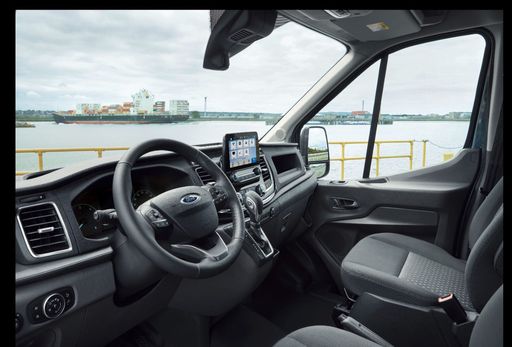 @ media.ford.com
@ media.ford.com
Nissan Qashqai
The Nissan Qashqai stands out in the compact SUV market with its sleek design and versatile features. Its smooth ride and refined interior make it a popular choice for both city driving and weekend adventures. Advanced safety technologies and user-friendly infotainment add to its appeal, ensuring a comfortable and secure driving experience for all passengers.
details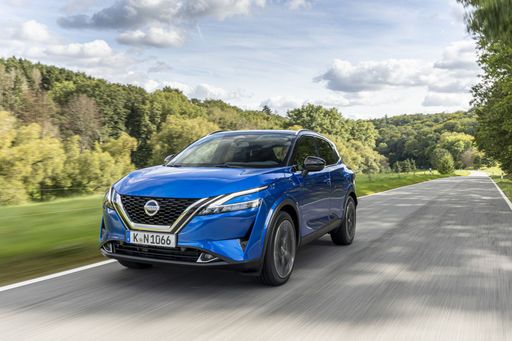 @ Nissan
@ Nissan
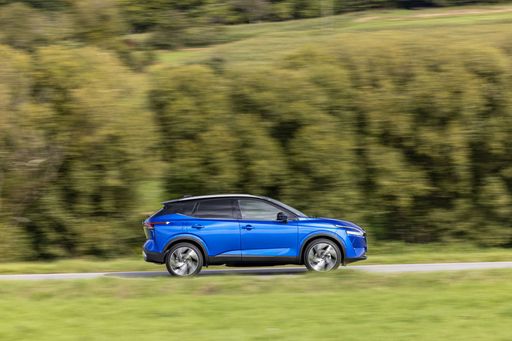 @ Nissan
@ Nissan
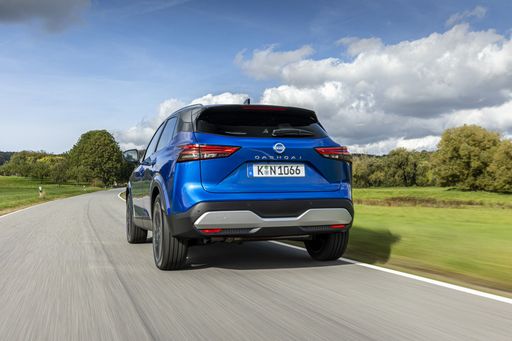 @ Nissan
@ Nissan
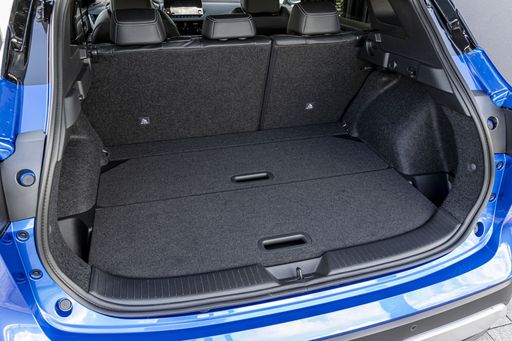 @ Nissan
@ Nissan
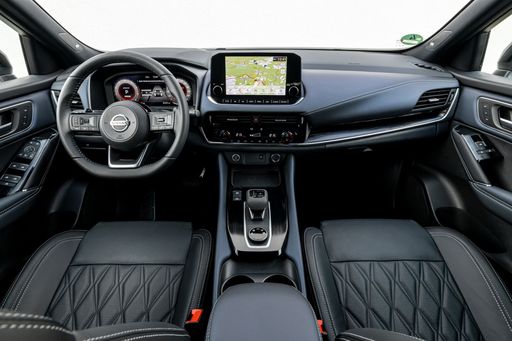 @ Nissan
@ Nissan

|

|
|
|
|
Costs and Consumption |
|
|---|---|
|
Price
50500 - 52900 £
|
Price
29400 - 42500 £
|
|
Consumption L/100km
9.4 - 9.5 L
|
Consumption L/100km
5.1 - 6.8 L
|
|
Consumption kWh/100km
-
|
Consumption kWh/100km
-
|
|
Electric Range
-
|
Electric Range
-
|
|
Battery Capacity
-
|
Battery Capacity
-
|
|
co2
245 - 248 g/km
|
co2
116 - 154 g/km
|
|
Fuel tank capacity
70 L
|
Fuel tank capacity
55 L
|
Dimensions and Body |
|
|---|---|
|
Body Type
Bus
|
Body Type
SUV
|
|
Seats
9
|
Seats
5
|
|
Doors
4
|
Doors
5
|
|
Curb weight
2338 - 2385 kg
|
Curb weight
1420 - 1665 kg
|
|
Trunk capacity
0 L
|
Trunk capacity
479 - 504 L
|
|
Length
5531 - 5981 mm
|
Length
4425 mm
|
|
Width
2059 mm
|
Width
1835 mm
|
|
Height
2530 - 2533 mm
|
Height
1625 mm
|
|
Payload
1115 - 1162 kg
|
Payload
466 - 520 kg
|
Engine and Performance |
|
|---|---|
|
Engine Type
Diesel
|
Engine Type
Petrol MHEV, Full Hybrid
|
|
Transmission
Automatic
|
Transmission
Manuel, Automatic
|
|
Transmission Detail
Automatikgetriebe
|
Transmission Detail
Schaltgetriebe
|
|
Drive Type
Front-Wheel Drive
|
Drive Type
Front-Wheel Drive, All-Wheel Drive
|
|
Power HP
130 - 150 HP
|
Power HP
140 - 190 HP
|
|
Acceleration 0-100km/h
-
|
Acceleration 0-100km/h
7.9 - 10.2 s
|
|
Max Speed
-
|
Max Speed
170 - 206 km/h
|
|
Torque
360 - 390 Nm
|
Torque
240 - 330 Nm
|
|
Number of Cylinders
4
|
Number of Cylinders
3 - 4
|
|
Power kW
96 - 110 kW
|
Power kW
103 - 140 kW
|
|
Engine capacity
1995 cm3
|
Engine capacity
1332 - 1497 cm3
|
General |
|
|---|---|
|
Model Year
2024
|
Model Year
2024
|
|
CO2 Efficiency Class
G
|
CO2 Efficiency Class
E, D
|
|
Brand
Ford
|
Brand
Nissan
|
Ford Transit Bus
The Versatile Ford Transit Bus from Ford
The Ford Transit Bus has always been a leader in the category of commercial passenger vehicles, and the 2024 model continues this legacy with a blend of reliability, innovation and modern design. With a range of configurations, the Ford Transit Bus is aimed at meeting the needs of businesses and individuals who require a spacious, dependable mode of transport.
Under the Bonnet: Technical Mastery
Power comes from a 2.0 EcoBlue diesel engine, available in power outputs of 130 and 150 PS. The engine is combined with an automatic transmission, ensuring a smooth drive even when fully laden. This Euro 6 compliant powerplant is designed for efficiency without sacrificing performance, sporting a fuel consumption range of 9.4 to 9.5 L/100km and an associated CO2 output of 245 to 248 g/km. Such numbers ensure that the Ford Transit Bus strikes a balance between power and economy.
Room to Spare: Exceptional Capacity and Comfort
The Ford Transit Bus is not just about getting from A to B; it’s about transporting passengers with utmost comfort. Depending on the specifications, the bus can accommodate between eight to nine passengers. The spacious interior is accompanied by an array of comfort features under the ‘Trend Automatik’ trim level, offering a practical and enjoyable ride experience for both drivers and passengers alike.
Dimensions and Practicality
Designed with practicality in mind, the Ford Transit Bus boasts dimensions that are fully suited to a variety of professional needs. Its length ranges from 5531 to 5981 mm, with a consistent width of 2059 mm and a height range from 2530 to 2533 mm. This translates to a generous loading capacity with a payload ranging from 789 to 1162 kg, making it a versatile option for businesses requiring ample cargo space alongside passenger accommodation.
Advanced Technology for Modern Roads
Aside from its primary function as a people mover, the Ford Transit Bus also shines with its technological prowess. It integrates advanced driver assistance systems aimed at ensuring both active and passive safety. This includes features that help drivers navigate through complex traffic situations and ensure maximum safety for all passengers.
A Smart Investment
The Ford Transit Bus is a competitive contender in its segment, offering not just performance and reliability but also reasonable costing. With monthly running costs ranging from €1,654 to €1,730 and cost per kilometre between 66.2 and 69.2 cents, businesses can expect an affordable operation without unexpected hikes in upkeep costs.
In conclusion, the Ford Transit Bus remains a clear front-runner among its peers, offering a combination of cutting-edge technology, impressive fuel efficiency, and a spacious, comfortable interior. Whether you are looking to enhance your fleet or need a robust transport solution, the Ford Transit Bus is a sound choice for the discerning buyer in 2024.
Nissan Qashqai
Exploring the New Nissan Qashqai: A Masterclass in Innovation and Performance
The Nissan Qashqai stands as a testament to the brand's continuous evolution in the competitive SUV market. Building on its robust reputation, the latest models bring a blend of style, efficiency, and groundbreaking technology that cater to the modern driver's needs. As we delve into the technical nuances and innovative features, it becomes evident why the Qashqai remains a top contender in its segment.
Powertrain and Efficiency: A Harmonious Balance
The latest Nissan Qashqai models feature an advanced range of powertrain options, including both mild-hybrid and full-hybrid systems. The 1.3 DIG-T MHEV engines provide power outputs ranging from 140 to 158 PS, ensuring a responsive driving experience while maintaining a remarkable fuel efficiency of 6.3 L/100km for automatic front-wheel drive versions. The full-hybrid 1.5 VC-T e-POWER delivers an impressive 190 PS while achieving a fuel efficiency of just 5.1 L/100km, demonstrating Nissan's commitment to ecological innovation.
Advanced Transmission Systems
Drivers can choose between manual or automatic transmissions, tailored to their driving style. The manual gearbox offers a tactile driving experience, while the automatic options, including a CVT and reduction gear transmission, ensure seamless power delivery and heightened efficiency. For those who seek greater traction and stability, all-wheel drive configurations are also available, enhancing the Qashqai's versatility.
High-Tech Interior: Comfort Meets Connectivity
The Qashqai's interior is a sanctuary of technology and comfort. The SUV features a user-friendly infotainment system with a touchscreen interface, compatible with both Android Auto and Apple CarPlay. The seamless integration of technology extends to advanced driver-assistance systems (ADAS) that include ProPILOT with Navi-link, enhancing convenience and safety during long drives or urban manoeuvres.
Performance and Dynamics: The Driving Experience
When it comes to performance, the Qashqai does not compromise. With acceleration from 0-100 km/h in as little as 7.9 seconds in the more powerful hybrid editions, and a top speed ranging from 170 to 206 km/h, Nissan ensures that excitement is part and parcel of the Qashqai driving experience. This balance of power and control is complemented by a well-tuned suspension system and precise steering response, providing a confident drive whether on highways or country lanes.
Design and Practicality: Where Form Meets Function
Sporting an aerodynamic silhouette, the Qashqai exudes a modern vibe that is both eye-catching and functional. Its dimensions, with a length of 4425 mm and a width of 1835 mm, provide ample cabin space for five passengers, along with a versatile boot capacity of up to 504 litres. These aspects make it an ideal choice for families and adventurers alike.
Conclusion: A Forward-Thinking Choice
The Nissan Qashqai remains a steadfast choice for those seeking an SUV that blends innovative technology with everyday practicality. With its advanced hybrid options and cutting-edge features, it not only meets but often exceeds the demands of today's environmentally conscious and tech-savvy drivers. As Nissan continues to push boundaries, the Qashqai stands as a beacon of what modern SUVs can achieve.
The prices and data displayed are estimates based on German list prices and may vary by country. This information is not legally binding.
